- Home
- Robin Hobb
Dragon Keeper Page 8
Dragon Keeper Read online
Page 8
She had not turned to him nor made any reply. She heard him sigh again. “I should have known that you were not an idle dilettante, waiting for someone else to come give shape and purpose to your life. Alise, I apologize. I’ve treated you badly in this regard. My intentions were good, or so I thought them. Now I perceive that I have been only serving my own ends, and trying to fit you into a space in my life where I thought you best should go. I’ve experienced the same sort of treatment from my own family, so I know what it is to have one’s dreams trampled.”
There was so much emotion in his voice that she felt shamed by it. “Please,” she said in a small voice. “Please, don’t let it concern you. It was an idle fancy, a cobweb dream that I have built too large. I shall be fine.”
He seemed not to hear her. “I came here with a gift today, thinking that perhaps I might persuade you to think better of me. But now I fear you can only see it as a mockery of your true dreams. Still, I pray you will accept it, as small reparation for what you have lost.”
A gift. The last thing she wanted from him was a gift. He’d brought her gifts before, the expensive lacy handkerchief, a tiny glass vial of fine perfume, fancy candies from the market, and a bracelet of seed pearls. Gifts that were all the dearer, procured as they were in a time of war. Gifts fit for a young maiden, gifts that had seemed to mock her, a woman on the verge of spinsterhood. She found her tongue and made it move to say the right things. “You are too kind to me.” If only he could understand that she meant the words with her whole heart.
“Please, come back and sit down. And let me give it to you. I fear you will find it more bitter than sweet.”
Alise turned away from the window. After staring out at the bright day, the room seemed dim and uninviting. Until her eyes adjusted, Hest was just a darker silhouette in the gloomy room. She didn’t want to sit down near him, didn’t want to take the chance of his reading on her face what she truly felt. She could make her voice obey her; it was harder to keep the truth from her eyes. She took a deep breath. She hadn’t cried, not a single tear. There was that to be proud of. And the man in the chair might represent the only other path fate was now offering her. She didn’t, she couldn’t believe in him.
But for now, the dictates of society directed that she must feign that she did. She would not make herself any more of a fool before him than she already had. She fixed her mind on the thought that whatever she might do or say to him now might become the humorous little tale that he told at a dinner years from now, when he had a true and appropriate wife at his side to laugh sweetly at his story of a foolish courtship before he’d met her. She schooled her face to a calm expression; she knew she could not manage to smile pleasantly yet, and she walked with a measured step back to her chair. She sat down and took up her cooling cup of tea. “Are you certain that you would not like me to freshen your tea for you?”
“Absolutely certain,” he replied brusquely. The beast. He wasn’t going to let her find refuge in polite small talk. She took a sip from her own cup to cover the flash of anger she felt toward him.
He twisted in his seat, retrieving a leather satchel from behind it. “I have a contact in the Rain Wilds. He’s a liveship captain who sails up there frequently. You know about the excavations at Cassarick. When they first found the buried city there, they were quite elated. They thought it would be like Trehaug was, with miles of tunnels to excavate and treasures to be found in chamber after chamber. But whatever disaster buried the Elderling cities was far harsher to Cassarick. The chambers had collapsed rather than merely filling with sand or mud. As of yet, little of anything has been found intact. But a few items were.”
He opened the satchel. His brief introduction had focused all her attention on the satchel. Trehaug was the major city of the Rain Wilds, built high in the trees in the swampland. But below it the Rain Wild Traders had found and plundered an ancient buried Elderling city. Similar mound formations at Cassarick near the serpents’ cocooning beach had seemed to promise a similar buried treasure city. Little had been heard since the trumpeting of the discovery, but that was not unexpected or unusual. The Rain Wild Traders were a short-spoken lot, keeping their secrets close even from their Bingtown kin. Her heart sank at Hest’s news. She had dreamed of them uncovering a library or at least a trove of scrolls and art. In her dreams, she had been there, lingering after the dragon hatch, and she had imagined herself saying, “Well, I’ve studied everything I could lay my hands on from Trehaug. I can’t translate all of this, but there are words I can pick out. Give me six months, and perhaps I’ll have something for you.” They would have been dazzled by her knowledge and grateful to her. The Rain Wild Traders would have recognized her worth; a translated scroll was worth hundreds of times the value of an undeciphered one, not just in terms of knowledge but in trade appraisal. She would have stayed on in the Rain Wilds, and been valued there. So she had imagined it a hundred times in her darkened room at night. On a summer afternoon, here in the parlor, her dream faded to a child’s self-indulgent imagining. It had, she thought again, all been a dream built of vanity and cobwebs.
“How sad,” she managed to say in an appropriate voice. “I knew there were such high hopes when rumors of a second buried city first surfaced.”
He nodded, his dark head bent over the buckles of the satchel. She watched his fingers work the strap through the metal and at last pull it free. “They did find one room with scrolls and such in it. The lower half of the room had silted in; I understand they are making efforts to salvage what they can of the scrolls that were buried, but the river water can be acid. However, there was one tall case in there, and six of the scrolls on the upper shelves were behind glass, in tubes made perhaps from horn and tightly stoppered. They were not perfectly preserved, but they did survive. Two seem to be plans for a ship. One has many illustrations of plants. Two others are possibly plans for a building. And the last one is here. For you.”
She could not speak. He had taken from the satchel a fat horn cylinder and she found herself wondering what sort of a beast had furnished such an immense and gleaming black horn. With a twist, he freed a wooden stopper from it, and then coaxed forth the contents. The scroll he drew out was pale tan, a thick roll of fine parchment wrapped around a dowel of polished black wood. The edges looked a bit frayed, but there were no outward signs of water damage or insect attacks or mildew. He offered it to her. She lifted her hands and then let them fall back in her lap. Her voice quavered when she spoke. “What . . . what does it concern?”
“No one is exactly sure. But there are illustrations of an Elderling woman with black hair and golden eyes. And a dragon with similar coloring.”
“She was a queen,” Alise breathed. “I don’t know how to translate her name. But images of a crowned woman with dark hair and golden eyes occur in four of the scrolls I’ve studied. And in one, she is shown being carried in a sort of basket by a black dragon. He flew with her in the basket.”
“Extraordinary,” Hest muttered. He sat very still, holding the scroll out to her. Alise discovered that her hands were gripping each other tightly. After a moment he said, “Don’t you want to look at it?”
She drew a ragged breath. “I know how much a scroll like that is worth; I know how much you must have paid for it.” She swallowed. “I can’t accept such an expensive gift. It’s not . . . that is . . .”
“It wouldn’t be proper. Unless we were engaged.” His voice had gone very deep. Was it a plea or a taunt?
“I don’t understand why you court me!” she burst out suddenly. “I’m not pretty. My family is not wealthy or powerful. My dowry is pitiful. I’m not even young. I’m past twenty! And you, you have everything, you are handsome, wealthy, intelligent, charming . . . why are you doing this? Why do you court me?”
He had drawn back from her a little bit, but he didn’t seem flustered. On the contrary, a small smile bent his mouth.
“Do you think this is funny? Is it some sort of joke, some wager, perhaps?�
�� she demanded wildly.
At those words, the smile fled his face. He rose abruptly, the scroll still clasped in his hand. “Alise, that is . . . beyond insult! That you could accuse me of such a thing! Is that what you truly think of me?”
“I don’t know what to think of you!” she responded. Her heart was beating somewhere in her throat. “I don’t know why you asked me to dance that first time. I don’t know why you court me. I fear it can only end in disappointment and . . . and humiliation when you finally realize I am unsuitable and walk away from me. I had become accustomed to the idea that I would never wed. I had found a new purpose for my life. And now I fear that I will lose both my resignation to my spinsterhood and my opportunity to be something besides a withered old maid in the back rooms of my brother’s house.”
Hest slowly sank back into his seat. He held the precious scroll loosely in his hands as if he had forgotten it, or at least forgotten how valuable an object it was. She tried not to stare at it. When he spoke, his words came slowly. “Again, Alise, you make me see I have been unfair to you. Truly, you are no ordinary woman.” He paused and it seemed to Alise that it was a century before he spoke again. “I could lie to you now. I could flatter you with sweet words and pretend to be infatuated with you. But I perceive now that you would soon see through such a ruse, and would disdain me all the more for attempting it.” He pressed his lips together for a long moment before he spoke again.
“Alise, you say you are not young. Neither am I. I am five years older than you are. I am, as you bluntly say, wealthy. The war has greatly affected our fortune, to be sure, as it has the fortune of every Bingtown Trader. And yet, as our trading has been diverse as are our holdings, we have been less damaged than many. I trust that we shall weather this war and emerge as a powerful family in the new Bingtown. And when my father dies, I will be the Trader for my family. I have been blessed, or sometimes I think, cursed, with a pleasing appearance. I have schooled myself to a charming manner, for we know that honey sweetens a bargain more than vinegar. I appear a social, convivial man, for that best suits the business I must do. Yet I do not think you will be surprised if I tell you that there is another Hest, a private and restrained one who, like you, enjoys being left in peace to pursue his own interests.
“I will tell you plainly that for several years now, my parents have been urging me to wed. I spent my youth in being educated and in traveling, the better to understand my father’s trading partners. Balls and festivals and indeed”—he gestured at the tray and cups—“polite tea parties bore me. And yet, according to my parents, I must court and wed a woman if I am to have children to follow me. I must have a wife who will keep track of our social duties, entertain lavishly when it is required, and move easily within Bingtown society. In short, I must marry a woman who is Trader born and raised. I admit that I would enjoy a quiet home of my own, and undemanding companionship from a woman who respected my foibles. So, when my parents told me, quite seriously, that I must either wed or begin to train my cousin to be my heir, I sighed at first. Then I looked about for a woman who would be calm, sensible, and able to be independent of me for her own amusements. I needed someone capable of running my household without my constant attention. A woman who would not feel neglected if left alone for an evening, or even for months, when business forces me to travel. You were suggested to me by one of my friends who had, indeed, heard of your interest in dragons and Elderlings. I believe you rather boldly went to his family home to borrow scrolls from his father’s library. He was very impressed with your forthrightness and your scholarship.”
His words froze her. She suddenly knew who had recommended her to him. Sedric Meldar, Sophie’s brother. He had been the one to help her find the scrolls in his father’s study on the day she had borrowed them. She had always felt friendly toward Sedric; she’d even been infatuated with him when she was a girl. Yet it still shocked her to think he had urged his friend to consider her as a bride. Unaware of her confusion, Hest continued his tale.
“So, when I was lamenting my situation, he told me that I should find no better bride than a woman who already had a life and an interest of her own. And so I have found you to be. Indeed, you have such a life and interest of your own that I begin to wonder if a husband is something you could fit into your schedule.” He suddenly lifted his dark gaze to her. Did a spark of amusement twinkle in those depths?
“This is not a romantic proposal, Alise. I suspect that you deserve far better than I am offering you. Yet, bluntly speaking, I do not think you will be offered better. I am a wealthy man. I am intelligent and well mannered, and I think myself kind. I think we shall get on well enough, me with my business and you with your scholarly pursuits. In fact, I think that after we are wed, we shall both be greatly relieved to leave behind the nagging of our parents. So. Can you give me an answer today, Alise? Will you marry me?”
He paused. She could find no breath to answer his outrageous proposal. He thought, perhaps, that she hesitated. He repeated what, to another woman, might have seemed insult most foul, but to her was simply an acknowledgment of their positions. “I do not think you will get a better offer. I am rich. Servants will do all the drudgery. You may hire whatever housekeepers and butlers you wish. Hire a secretary and a cook to plan our dinners and entertainments. Whatever staff you need to preserve our façade, you shall have. You will have not only the time to pursue your studies, but an income sufficient to acquire the scrolls and books you require. And if you must travel to follow your studies, I will provide you with the proper companionship to allow you to do so. I do, sincerely, regret that I have made you lose the opportunity to see the dragons hatch. I promise you that if you accept my proposal, you will be allowed to journey up the Rain Wild River and take whatever time you think you need to study the creatures for yourself. Come now. You cannot hope for a better bargain than that!”
Alise spoke slowly. “You would buy me, in the hopes of a simpler life for yourself. You would buy me, with scrolls and time for scholarship.”
“You put it a bit crudely, but—” “I accept,” she said quickly. She held out her hand to him, thinking perhaps he would lift it to his lips and kiss it. Thinking, perhaps, he might even draw her into an embrace. Instead, he took it with a smile, shook it firmly as if they were two men sealing an agreement, and then turned it palm up. He set the treasured scroll into it. It was heavy, preserved by oil rubbed into it perhaps. The smell of its secrets rose to entice her. She hastily raised her other hand to cradle the precious thing. Hest was speaking, his deep voice rich with satisfaction.
“With your permission, I will announce our nuptials at the Summer Ball. After, of course, I have begged your father’s leave.”
“I scarcely think you will have to beg it,” she murmured. She clasped the scroll to her breast as if it were her firstborn and wondered what she had agreed to do.
THE HEELS OF Hest’s boots clacked sharply against each stone step as he descended from the entry of the Kincarrons’ modest manor house. Sedric straightened up from where he had been lounging against the tall red wheel of the pony trap. He brushed his brown hair back from his eyes and smiled as his tall friend approached. The broad grin on Hest’s face promised good tidings. The little horse lifted his head and whickered softly as Sedric greeted him with, “And so?”
“Both so impatient, are you?” Hest asked them affably as he approached.
“Well, you were a bit longer than we thought you’d be,” Sedric agreed as he clambered to the seat and took up the reins. “I thought it might mean things weren’t going so well. The signs lately have not been encouraging.”
Long-legged Hest easily mounted to the passenger side of the cramped vehicle and sat down with a sigh. “I hate this contraption. The top of the seat hits me just above the small of my back, and the wheels find every bump in the road. I’ll be grateful when father lets me put the carriage back into ser vice.”
Sedric clucked to the horse and he leaned into his harness. “
I expect that won’t be soon. While the roads are so bad, this is a much more sensible mode of transport. We can thread our way around and through the blockages in the streets. Half of Gold Drive is blocked with stacked timber this week, and that’s because they’re rebuilding. There is still so much of Bingtown that needs to be demolished and hauled away before new structures can be erected. Half the shops in the Grand Market are still burned husks.”
“And the summer only makes the reek of the burned-out buildings worse. I know. I tried to find an open tea shop there yesterday, and the stench drove me away. I know the pony trap is more sensible. Just as wedding Alise Kincarron is the sensible thing to do. I don’t have to like either one, only endure them. I tell you, Sedric, I’ve only been sensible for a few months now, and I’m already heartily sick of it.” With a groan, Hest leaned his lanky frame back on the low-backed seat, then sat up with an exclamation of disgust and rubbed his back. “This is the most uncomfortable mode of transport ever invented. Why on earth did the Kincarrons build their manor so far from the center of town?”
“Possibly because it was the piece of land they were originally granted by the Satrap. It’s had one benefit for them. The raiders and the looters didn’t want to come out this far.”
“Keeping an ugly house intact is small recompense for living in such a forsaken location. Didn’t they ever consider moving to a better part of town?”
“I doubt they’ve had the financial option.” “Seems like poor planning. A few less daughters to dower and they’d have had a better estate for their sons.”

 Ship of Destiny
Ship of Destiny Golden Fool
Golden Fool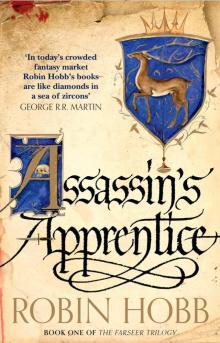 Assassins Apprentice
Assassins Apprentice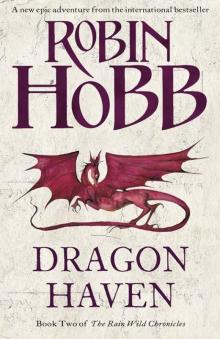 The Dragon Keeper
The Dragon Keeper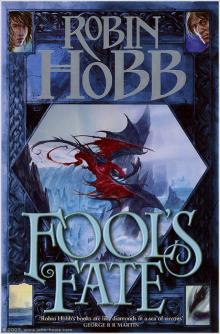 Fools Fate
Fools Fate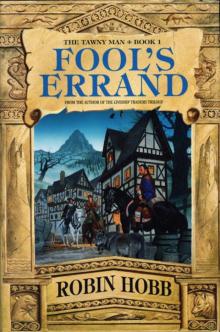 Fools Errand
Fools Errand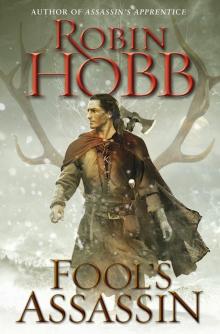 Fools Assassin
Fools Assassin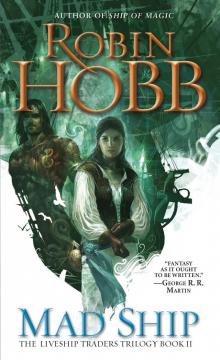 The Mad Ship
The Mad Ship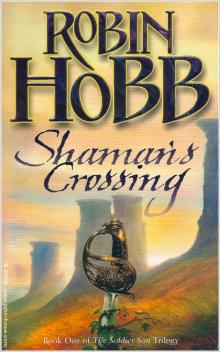 Shamans Crossing
Shamans Crossing Ship of Magic
Ship of Magic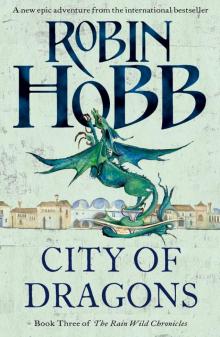 City of Dragons
City of Dragons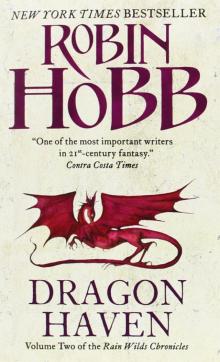 Dragon Haven
Dragon Haven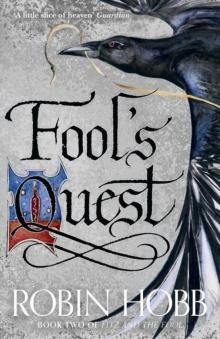 Fools Quest
Fools Quest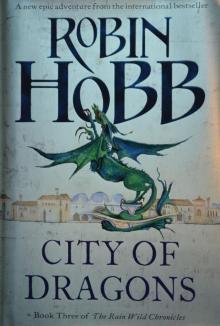 Blood of Dragons
Blood of Dragons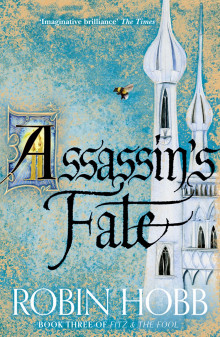 Assassin's Fate
Assassin's Fate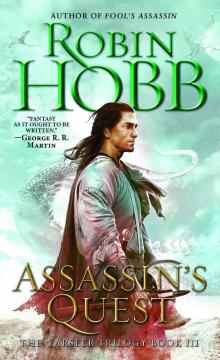 Assassins Quest
Assassins Quest Renegades Magic
Renegades Magic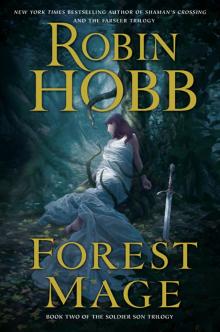 Forest Mage
Forest Mage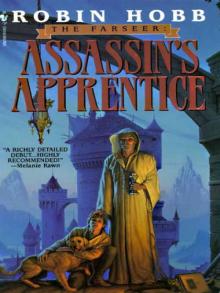 Assassin's Apprentice tft-1
Assassin's Apprentice tft-1 Assassin's Quest tft-3
Assassin's Quest tft-3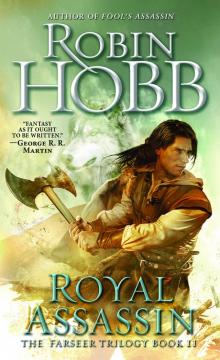 Royal Assassin
Royal Assassin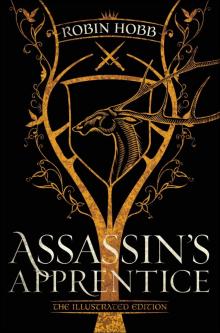 Assassin's Apprentice (The Illustrated Edition)
Assassin's Apprentice (The Illustrated Edition)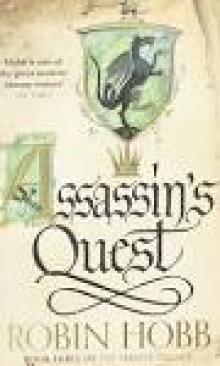 Assassin's Quest (UK)
Assassin's Quest (UK) Royal Assassin (UK)
Royal Assassin (UK)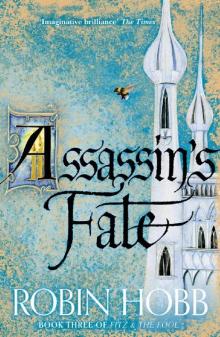 FF3 Assassin’s Fate
FF3 Assassin’s Fate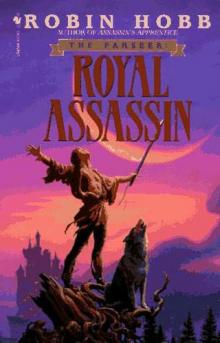 Royal Assassin tft-2
Royal Assassin tft-2 Fool’s Assassin: Book One of the Fitz and the Fool Trilogy
Fool’s Assassin: Book One of the Fitz and the Fool Trilogy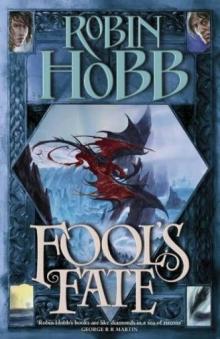 Fool's Fate ttm-3
Fool's Fate ttm-3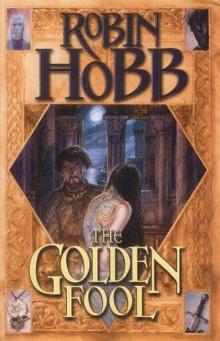 The Golden Fool ttm-2
The Golden Fool ttm-2 The Liveship Traders Series
The Liveship Traders Series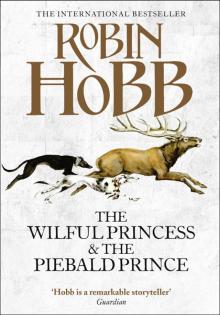 The Wilful Princess and the Piebald Prince
The Wilful Princess and the Piebald Prince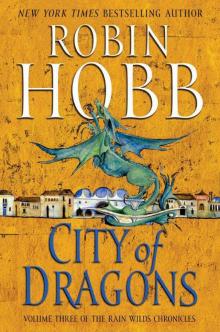 City of Dragons rwc-3
City of Dragons rwc-3 The Tawny Man 1 - Fool's Errand
The Tawny Man 1 - Fool's Errand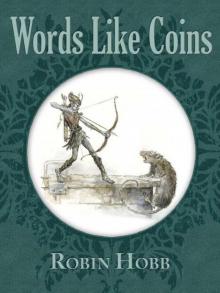 Words Like Coins
Words Like Coins The Complete Tawny Man Trilogy Omnibus
The Complete Tawny Man Trilogy Omnibus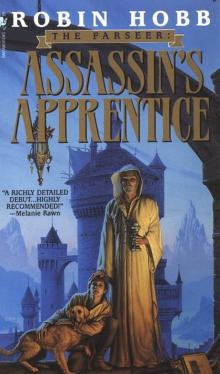 Farseer 1 - Assassin's Apprentice
Farseer 1 - Assassin's Apprentice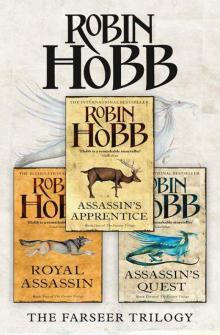 The Complete Farseer Trilogy Omnibus
The Complete Farseer Trilogy Omnibus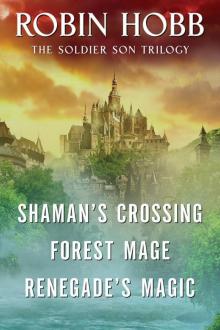 The Soldier Son Trilogy Bundle
The Soldier Son Trilogy Bundle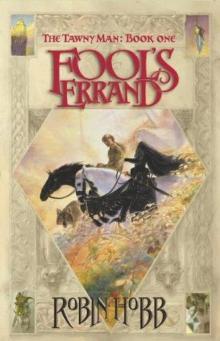 Fool's Errand ttm-1
Fool's Errand ttm-1 Blue Boots
Blue Boots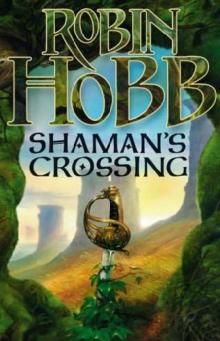 Shaman's Crossing ss-1
Shaman's Crossing ss-1 Mad Ship
Mad Ship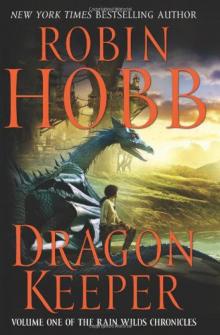 Dragon Keeper
Dragon Keeper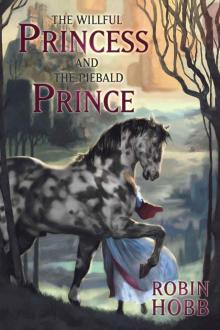 The Willful Princess and the Piebald Prince
The Willful Princess and the Piebald Prince Ship of Destiny tlt-3
Ship of Destiny tlt-3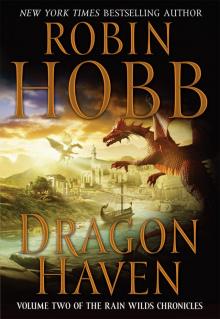 Rain Wild Chronicles 02 - Dragon Haven
Rain Wild Chronicles 02 - Dragon Haven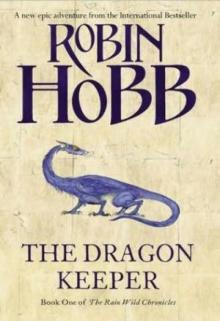 The Dragon Keeper trwc-1
The Dragon Keeper trwc-1 The Triumph
The Triumph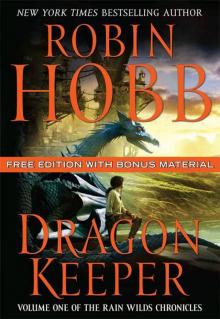 Dragon Keeper Free Edition with Bonus Material
Dragon Keeper Free Edition with Bonus Material Mad Ship tlt-2
Mad Ship tlt-2 The Inheritance and Other Stories
The Inheritance and Other Stories Tawny Man 02 - Golden Fool
Tawny Man 02 - Golden Fool Farseer 2 - Royal Assassin
Farseer 2 - Royal Assassin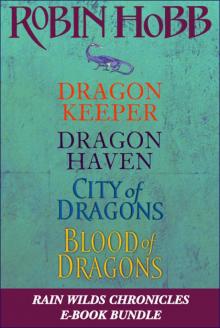 Rain Wilds Chronicles
Rain Wilds Chronicles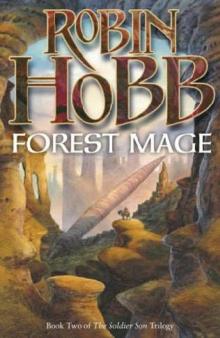 Forest Mage ss-2
Forest Mage ss-2 Ship of Magic lt-1
Ship of Magic lt-1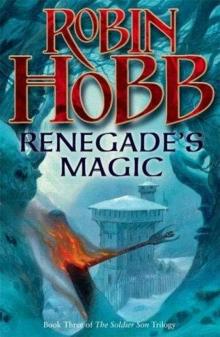 Renegade's Magic ss-3
Renegade's Magic ss-3